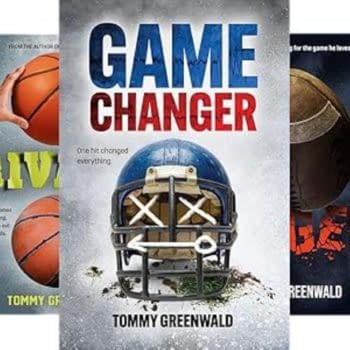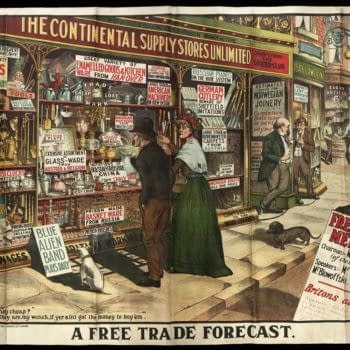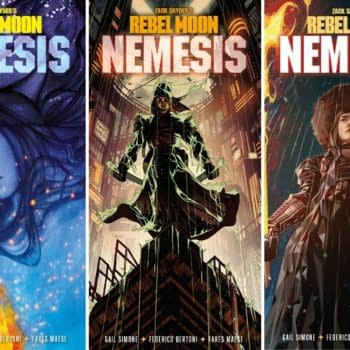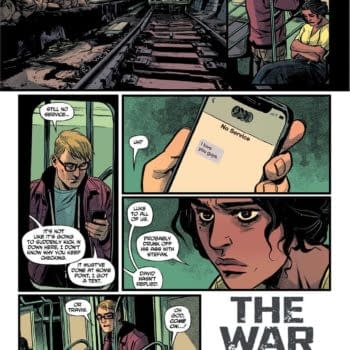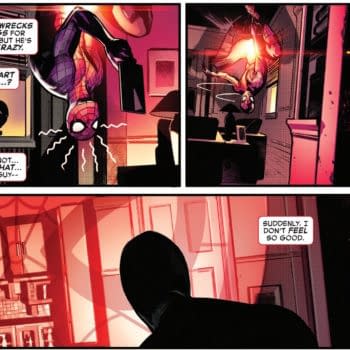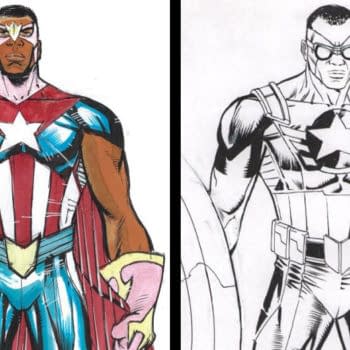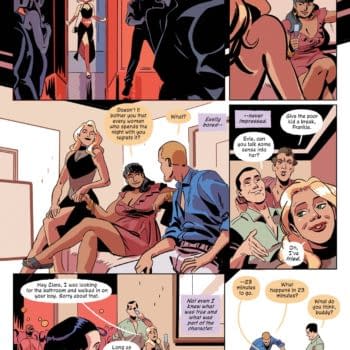Posted in: Comics | Tagged: Comics, dynamite, garth ennis, the boys
Garth Ennis Commentary On The Boys #66
Garth Ennis writes for Bleeding Cool;
Page one
Bit of conjecture on the side-effects of depleted uranium ammunition on its users here. I've always been fascinated by the notion of military personnel being issued weapons and equipment that isn't up to the job, or that's just plain dangerous to the user- aircraft structurally prone to stalling, or pistols that blow up in the owner's hand- but D.U. seems to be one step beyond.
There used to be a wrecked Iraqi tank sitting on Pier 86 next to the Intrepid museum, over on New York's west side- it had been brought back from the 1991 Gulf War and displayed with the holes made by American shells there for all to see. Eventually it was removed, apparently (I was told at the time) because the hull still retained a possibly dangerous level of radiation from the D.U. shell that had gutted it.
"Like the place at the end of Terminator 2 but with everything switched off", I told Russ. Bit lazy, but it's just a location so it's hardly plagiarism. Unlike, for instance, the instruction to "make him like that Barracuda guy in The Punisher" that I'm told showed up in someone's script not so long ago. Dearie me…!
Page two
The earlier Terminator reference sparked that last line. Why not, I'm sure Butcher watched it at some stage, on a plane or whatever. Altogether now: "I know now vy you cwy- but it is somethink I can nevah doooo.,,"
Page three
In panel 3 we get the standard Squaddie's complaint about Tankie arrogance, probably since tanks first appeared (that's Grunt and Tanker in US parlance, incidentally). A friend of mine who spent twelve years in the British army told me the infantry's antidote: wait 'til you're on exercise, and when a tank goes by lash it with machine-gunfire from stem to stern. The crew sit inside hearing this stuff ricocheting off their hull and thinking just what realistic training this is, and in the meantime all their kit that they've slung from the turret- packs, sleeping bags, food and booze- is getting blasted to oblivion.
Speaking of this sort of thing, I recently met a US Army officer who'd transferred from tanks to infantry because he hated tanks. He corrected himself- "No, not tanks, tankers. I hate their attitude. They basically believe "there's always a bigger hammer". They think nothing of firing a D.U. penetrator from the main gun at single insurgent, just to see what a 120mm round will do to a human body." Which immediately put in me in mind of The Boys #65, but I decided to keep that to myself.
Page four
Bloody hell, it's Butcher- although you knew that from about panel 2 on page one, because no one else in comics sounds like him. I sometimes think you could get away with anything if you spoke in that accent- a theory that the big man will spend the next six issues attempting to prove.
Bazooka is a word that seems to have fallen out of favour in recent years, people preferring LAW or RPG. But in the World War Two era (and for kids raised in the succeeding 30-40 years, such as Butcher and myself) it was widely known. It refers to a shoulder-launched rocket that was issued to American troops for the purpose of destroying German tanks, which it usually failed to do. There's a very realistic demonstration of its use towards the end of Saving Private Ryan, wherein Tom Sizemore encounters a good deal of frustration while engaging a Tiger tank. A bloke in Band Of Brothers has better luck, if only because his officer forces him to wait for the target to get suicidally close.
Pages five-seven
Nothing beats New York in the snow- for the first 24 hours, at any rate. "I'm gonna walk," said a friend of mine last year before a twenty block midnight hike in about 18 inches of the stuff, "How often do you get to see the city like this?" Too true. Of course, the subsequent ten days of grey slush and icy sidewalks are no fun at all. I once saw a bloke disappear into one of those pools of slop that develop on the really badly-maintained, misshapen corners, where the drain blocks straightaway and the banks of snow create a flooded pit. He was up almost instantly, screaming and spitting, slathered in grime and cigarette butts and dogshit and whatever else was floating around in there- but for one incredible moment his entire body was under the surface.
But that first day, when the sky is silver-white and the city basks in impossible silence, and then night comes and the clouds reflect the golden glow from beneath- that's truly something. Time to relax and reflect. Time to think about that guy whose head you kicked off and whose ghastly spurtings have been haunting your dreams ever since.
Some people don't realize The Boys is set over only a couple of years, roughly 2006-8, no matter how many hints I drop in. There's a tendency to think that these 60+ issue epics take place in real time, when in fact they couldn't possibly. Preacher, Transmetropolitan, Y The Last Man– what, about 2-3 years each? Tops?
Pages eight-eleven
What does a French lunatic do when he gets his arm blasted off? Why, dress up like Napoleon, of course. Not that old Boney ever lost a limb, but the opportunity to do the famous arm-in-coat pose was too good to miss.
Hughie's skills in command and self-assertion are certainly not all they might be, but if you will spend months moping about committing cold-blooded murder you're never going to get anywhere, are you? In fact, our hero's total inability to learn from his mistakes and change his ways will eventually stand him in good stead- though he probably doesn't see it that way right now.
No doubt Hughie's tendency to mope and turn inwards is a source of frustration to many readers, all used to comic heroes who learn from experience and develop into fully-rounded characters ready to handle anything. In my experience this is like no one who's ever existed in real life; even the most capable people either maintain or eventually return to their essential flaws. I doubt any twenty-something lad unused to trauma and violence could simply absorb it straightaway, and if he did become hardened or inured it would be as a different, less sensitive person. In other words, Hughie's bizarre triumph is that he remains Hughie.
If it's self-assertion you're after, just go back to page four.
Pages twelve-fourteen
The Vought-American executives generally- and Stillwell and Bradley in particular- exhibit the kind of behaviour with which I imagine Wall Street responded to the Occupy movement: cool-headed observation, rational analysis, no sense of alarm. When time, money and power are on your side, why get upset? I'm speaking here of the CEOs and greater demons, not the little savages who bawl numbers at each other on the floor of the exchange- I'm sure they reacted with a good deal more vitriol to the ragged band encamped outside.
Little bit of corporate manure from CEO Brewster here, particularly regarding the use of the word family. It's a source of constant amazement to me that people swallow the idea that their job is anything like a family- "You're part of the Megalo-Omnicorp family now", etc etc. I've seen intelligent, rational adults react with amazement when the dreadful day came and their "family" gave them the boot. As has been said, show me a family where Dad eats first.
(My other least favourite bullshit-isms are probably you need to, in the sense of a thinly and pathetically disguised command, and we want to work together, meaning we don't.)
As for Stillwell's comments on Wikileaks, I do sometimes wonder just how much people are prepared to sit still for- or how much shit they're prepared to eat, to put it another way. This was at the forefront of my mind for a good deal of the Bush era, although there wasn't anything particularly new about the concept: the Irangate scandal of 1987 at least forced Ronald Reagan to publicly apologise to the American people, but his vice-president was deemed innocent of any wrongdoing and elected to power a year later.
Lest this be thought an anti-American screed, remember that many British people gave themselves a good old pat on the back for the various protests and marches conducted during the run-up to the 2003 Iraq War. Two years later, with a chance to decisively censure Tony Blair for his wrongdoing, they gave him a parliamentary majority that either of his predecessors would have killed for. But let's agree, as Stillwell and Bradley do, that there's a limit beyond which public opinion simply will not accompany you.
I hope…
Pages fifteen-eighteen
Butcher does his thing. You can just imagine him in #56, noting the demand for promotion outside Dr. Peculiar's, and thinking- you reckon you're being smart, but this will come back to bite you in the arse, my son. And then, an issue later, noticing how easy it was for Hughie to piss Frenchie off completely by accident- Bingo. Ah, Billy. My all-time favourite creation.
This is as good a time as any to talk about Russ Braun's absolute mastery of his art (although I do love his take on Butcher; there's a headshot from his sketchbook on my office wall that I put up to keep me focused while writing #60-72). His storytelling is flawless, his characterization is constant- there's never any weird variation in any one person's face- and his ability to "move the camera" so things remain clear but never get staid is a marvel in itself. But beyond that, Russ has the ability to think his way into the script, as I like to put it: he never ignores background detail or deems characters that aren't talking in a particular panel irrelevant. He knows, say, that X has to look a certain way because he's thinking about Y, or that A's got to be smiling because in a moment he'll be doing B. Too many artists omit details of script direction because it doesn't occur to them why someone has to have the expression they do. But not the guys who take the time to think their way in.
A skill like this gets little attention or praise because- like good acting- it's supposed to be invisible. I'd love to be able to claim that I discovered Russ personally and was the only one to recognize his genius, but in fact he's been drawing comics on and off for twenty years. Such a quiet, deft approach to art will often go unnoticed while flashier talents bask in the limelight, but for sheer storytelling ability I think there are few to touch the man. In that regard alone, I'd put him in the same class as Steve Dillon.
Pages nineteen & twenty
Faint heart ne'er won fair lady, my little Scots chum.
Pages twenty-one & twenty-two
"Come on, Tony," I exhorted our colourist when I saw the few paltry red specks he'd initially produced at the bottom of page 21, "get a bit more blood into that cum." Not the strangest colouring direction I've given Mr. Avina during his tenure on the book, but not the kind of thing you encounter working on Batgirl, either. Still, Tony manfully rose to the task and gave us what we needed. The results are there for all to see.
Next issue: the last word on creators' rights, courtesy of The Legend.


















